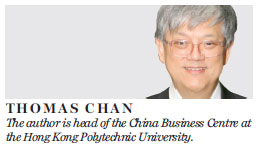HK must develop the yuan market
Updated: 2015-12-21 07:55
By Thomas Chan(HK Edition)
|
|||||||
Thomas Chan writes that Hong Kong needs to offer the world more financial products in renminbi in order to capitalize on the Belt and Road Initiative
The renminbi has been accepted by the International Monetary Fund (IMF) as part of the special drawing rights (SDR) basket of currencies, effective from October 2016. The inclusion of the RMB in the SDR basket is symbolically very significant, particularly as its weighting is larger than those of the British pound and Japanese yen. This is a full recognition of China's graduation from the ranks of developing countries and emerging markets.
SDR at most is a reserve currency for members of the IMF to use within their individual assigned quotas with very limited purposes. It will not lead to a sudden global demand for the RMB simply because it will become part of SDR in 2016. Countries also have not used the relative shares of the guidelines to decide the composition of their reserve assets. However, the present system of SDR has reflected the preference for the individual reserve currencies of central banks, albeit under the domination of the US and the US dollar. The large reduction of the relative share of the euro in favor of the yuan might be the latest action of the US to undermine the competitive challenge of the euro to the US dollar. The euro replaced the US dollar as the most popular payment currency before the end of 2013 after the financial tsunami of 2008-09.
Despite official preference, use of a currency both as a reserve one in the official sector and as payment currency in the private sector depends on multiple factors. These include the country's share in world output and trade, macroeconomic stability, financial market development and network externalities. As the second-largest economy and largest trading country of the world, with a process of gradual offshore liberalization of the yuan, China should be able to increase use of the RMB outside the mainland. This has been evidenced in the rapid jump of the RMB as the fourth or fifth most popular payment currency in recent months. More significantly, it is only second to the US dollar in the use of issuance of letters of credit in world trade.
In the case of the yuan, there is still a large discrepancy between China's share in world output and trade and its share in global payment transactions. Given the proactive efforts of Beijing to promote yuan internationalization and the increasing transaction risks caused by a very strong US dollar, there will be a greater use of the yuan in payments in future. The more it is used in transactions, the more popular it will become. This will trigger a "virtuous cycle" on the basis of network externalities. Its inclusion in the SDR basket simply reinforces this tendency.
The SAR is the largest center for yuan internationalization with the largest pool of yuan deposits. Therefore, Hong Kong is in a position to benefit from the expansion of the yuan in the international arena. However, the city is also less equipped in the local financial market institutions and industry to capitalize on the expected rise in demand.
Both financial instruments and products in RMB in Hong Kong are rather limited. The large pool of deposits is attracted by the expectation of appreciation and higher interest rate; investors would be discouraged by the strong US dollar - which obliges a relative depreciation of the RMB - and the expected increase in interest rate of US dollar assets. The majority of the mainland's trade, and in particular that conducted in yuan, has not gone through Hong Kong - which focuses on US dollar-denominated processing trade. This means the more the RMB is used in the mainland's trade and in outbound investment, the greater will be the circulation of RMB outside Hong Kong. This reduces the city's role in the internationalization of the yuan. London has jumped on the bandwagon to compete with Hong Kong for yuan business. Given the depth and breadth of London's international financial markets and its urge to serve as the largest offshore yuan market - as it did for offshore US dollar development - Hong Kong might not be able to compete unless it comes up with more active initiatives and innovations.
Hong Kong needs to see itself as having more than a passive role as the secondary market of A-shares and as a wealth management center (if not money laundering and tax evasion hub) for rich mainland businessmen. It needs to offer more well-managed financial products in RMB, not just for local and mainland residents but for non-residents from all over the world. It needs also to attract firms and investors, especially international banking and financial institutions to develop and engage in new financial products and services in RMB. These tasks are formidable. They represent the need for a reorganization and upgrading of institutional arrangements in Hong Kong. If they are not undertaken, Hong Kong may lose a golden opportunity to become the financial and services center of the greater realm of China and of the RMB for the Belt and Road Initiative.

(HK Edition 12/21/2015 page10)